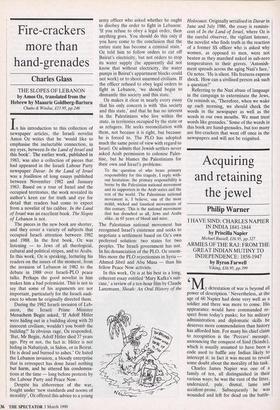Fire-crackers more than hand-grenades
Charles Glass
THE SLOPES OF LEBANON by Amos Oz, translated from the Hebrew by Maaurie Goldberg-Bartura
Ghetto & Windus, £13.95, pp.246
In his introduction to this collection of newspaper articles, the Israeli novelist Amos Oz writes that he 'would like to emphasise the ineluctable connection, in my eyes, between In the Land of Israel and this book'. The earlier work, published in 1983, was also a collection of pieces that had appeared in the Israeli Labour Party newspaper Davar. In the Land of Israel was a feuilleton of long essays published between November 1982 and January 1983. Based on a tour of Israel and the occupied territories, the work revealed its author's keen ear for truth and eye for detail that readers had come to expect from a novelist of his calibre. In the Land of Israel was an excellent book. The Slopes of Lebanon is not.
The pieces in the new book are shorter, and they cover a variety of subjects that occupied Israeli attention between 1982 and 1988. In the first book, Oz was listening — to Jews of all theological, cultural and political stripes, and to Arabs. In this work, Oz is speaking, lecturing his readers on the issues of the moment, from the invasion of Lebanon in 1982 to the debate in 1988 over Israeli-PLO peace talks. Perhaps the good novelist in him makes him a bad polemicist. This is not to say that some of his arguments are not important, particularly for the Israeli audi- ence to whom he originally directed them.
During the 1982 Israeli invasion of Leb- anon, the Israeli Prime Minister Menachem Begin asked, 'If Adolf Hitler were hiding out in a building along with 20 innocent civilians, wouldn't you bomb the building?' In obvious rage, Oz responded, 'But, Mr Begin, Adolf Hitler died 37 years ago. Pity or not, the fact is: Hitler is not hiding in Nabatiyah, in Sidon, or in Beirut. He is dead and burned to ashes.' Oz hated the Lebanon invasion, a bloody enterprise that in retrospect has done Israel nothing but harm, and he uttered his condemna- tions at the time — long before protests by the Labour Party and Peace Now.
Despite his abhorrence of the war, fought under 'new standards and norms of morality', Oz offered this advice to a young army officer who asked whether he ought to disobey the order to fight in Lebanon: `If you refuse to obey a legal order, then anything goes. You should do this only if you have come to the conclusion that the entire state has become a criminal state.' Oz told him to follow orders to cut off Beirut's electricity, but not orders to stop its water supply (he apparently did not know that without electricity, the water pumps in Beirut's appartment blocks could not work) or to shoot unarmed civilians. If the officer refused to obey legal orders to fight in Lebanon, 'we should begin to dismantle this society and this state.'
Oz makes it clear in nearly every essay that his only concern is with 'this society and this state,' and that he has no interest in the Palestinians who live within the state, in territories occupied by the state or as refugees. He seeks reconciliation with them, not because it is right, but because he is forced to. The PLO has adopted much the same point of view with regard to Israel. Oz admits that Jewish settlers never asked Arab permission to colonise Pales- tine, but he blames the Palestinians for their own and Israel's problems: To the • question of who bears primary responsibility for this tragedy, I reply with- out hesitation: the primary responsibility is borne by the Palestinian national movement and its supporters in the Arab states and the rest of the world. The Palestinian national movement is, I believe, one of the most stolid, wicked and fanatical movements of this century. This is the national movement that has drenched us all, Jews and Arabs alike, in 65 years of blood and mire.
The Palestinian national movement has recognised Israel's existence and seeks to negotiate a settlement based on Oz's own preferred solution: two states for two peoples. The Israeli government has not. In his denunciation of the PLO, Oz resem- bles more the PLO rejectionists in Syria— Ahmed Jibril and Abu Musa — than his fellow Peace Now activists.
In this work, Oz is at his best in a long, coherent essay entitled 'Mary Kafka's suit- case,' a review of a ten-hour film by Claude Lanzmann, Shoah: An Oral History of the Holocaust. Originally serialised in Davar in June and July 1986, the essay is reminis- cent of In the Land of Israel, where Oz is the careful observer, the vigilant listener, the novelist who finds truth in the reaction of a former SS officer who is asked why women, as opposed to men, were not beaten as they marched naked in sub-zero temperatures to their graves. 'Astonish- ment spreads across the aging Nazi's face,' Oz notes. 'He is silent. His features express shock. How can a civilised person ask such a question?'
Referring to the Nazi abuse of language in the campaign to exterminate the Jews, Oz reminds us, 'Therefore, when we wake up each morning, we should check the words in the newspaper as well as the words in our own mouths. We must treat words like grenades.' Some of the words in this book are hand-grenades, but too many are fire-crackers that went off once in the newspapers and will not be reignited.


























































 Previous page
Previous page